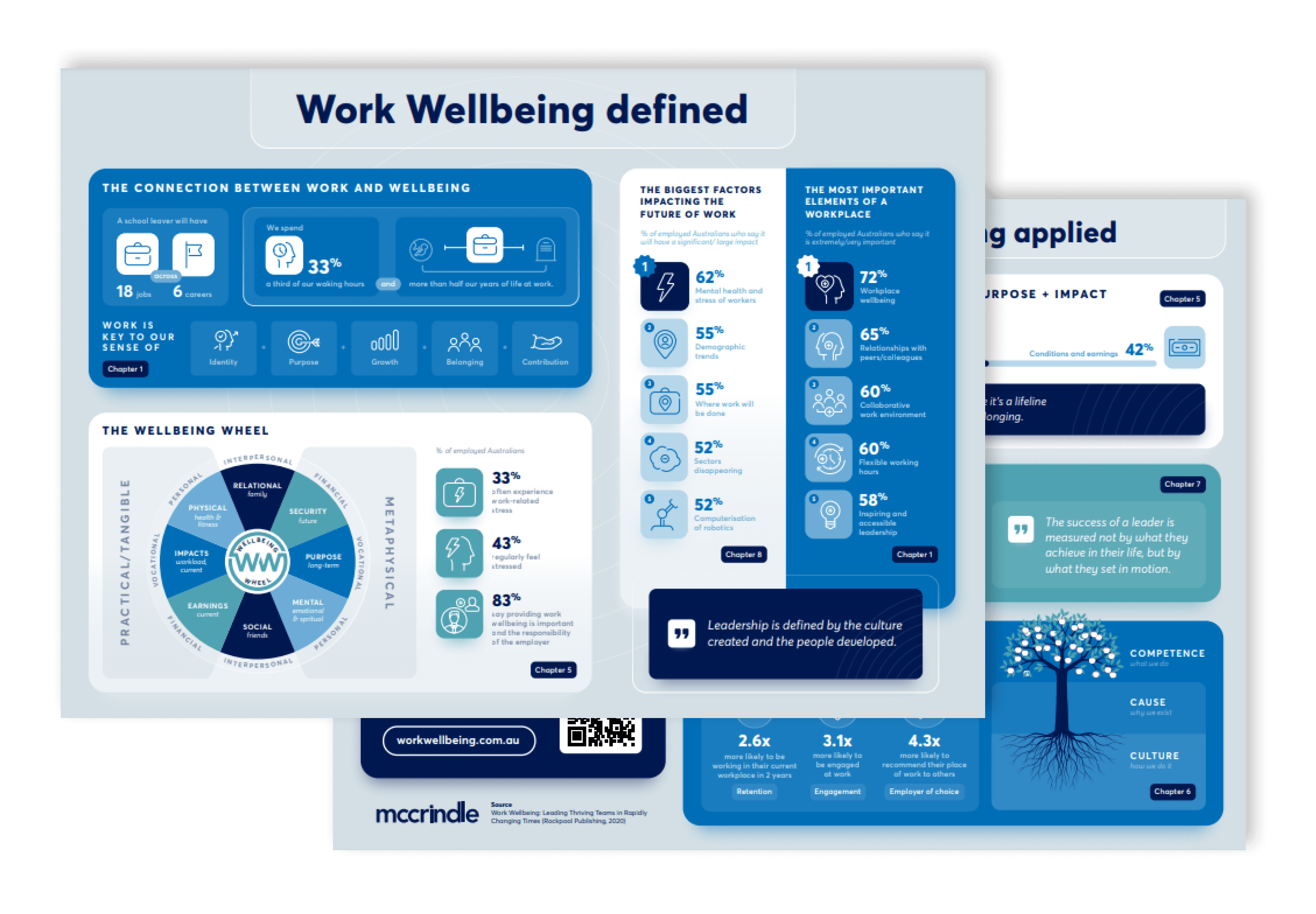Work Wellbeing
Why teacher wellbeing is important and worth the time

In recent times there has been concern about the dropout rate of teachers, and how to continue to attract teachers in an increasingly flexible world of work. Although working in education can have its challenges, more than nine in ten educators (93%) say they are likely to recommend a career in the teaching to someone looking to start or change careers 1.
While educators are largely positive about their experience of working in the sector, the greatest blocker to educators thriving at work is being overworked and stressed (39%). Leadership can also be a blocker, with resistance to change (23%) and management structures/hierarchy (23%) identified as blockers to educators thriving in the workplace. Despite these challenges, one in five educators (21%) feel they are thriving at worki. In this article we explore the perspective and sentiment that teachers shared with us in focus groups about working in the education sector, and why investing in teacher wellbeing is important and worth the time.

Teachers desire to make a difference
There are several reasons people choose to enter the teaching profession, but the key driver is often to make a difference in the lives of students; to educate and equip a generation for a life well lived. Many also like the variety in each day and appreciate working with a generation they believe in. One educator told us that, “The relationship you get with kids is priceless, to have such an impact on them and be that positive role model is a great honour.2”
Most Gen Y teachers have thought about leaving the profession
Most high school teachers and most primary school teachers have contemplated leaving the teaching profession at one point in their career. Some teachers have experienced burnout from the amount of time spent on administration and documentation over and above the time spent teaching in the classroom and planning lessons. This is a key reason that teachers have considered leaving the teaching profession.
“It’s sad because the teachers that are passionate and do care and do want to take on more, the load that comes with that desire and willingness is just enormous and it gets to the point where you lose the joy of it. Last year was my 10th year teaching and I had been on primary exec for four years before that, and last year, I resigned from my position. You’re constantly being pulled in all these different directions and it’s not being able to do any of them to a level or a standard you’re satisfied with.”
For many teachers there is also the challenge of switching off at the end of the day. Many told us that the continuous workload of marking and lesson preparation is one that never ceases, and it takes discipline to say it can wait until tomorrow.
Student wellbeing affects teacher wellbeing
The rising focus on student’s mental health and wellbeing is having negative effects on teacher wellbeing. While Gen Y teachers believe the focus on student wellbeing is necessary, they are feeling the pressure of expectation to manage multiple student wellbeing issues at the detriment of classroom learning and their own health.
The issues young people are facing today are increasingly complex. As adults in a position of trust, teachers are working to help students negotiate these life challenges and can be negatively affected in the process.
“I’ve actually had to see the school psychologist on two occasions because student stuff was just so heavy. It was too much even for me to deal with even though I practice positivity, I actually needed a professional to help me deal with some of it.”
Lifestyle is a key reason teachers stay in the profession
While the flexibility and lifestyle of teachers’ working arrangements is not a key factor in attracting most teachers, it does help to keep them in the profession. When teachers have had opportunities for other employment, the ability to spend time with family in the holidays has played a part in their decision to stay.
“I had an opportunity to pursue floristry but the reason I said no was because the pay and the work life balance in terms of family and holidays with children is quite good. It is a fulfilling job, you’re working with children, even with the admin and the welfare, there are a lot of positives.”
Beyond the lifestyle, however, teachers are passionate about helping their students learn and grow. Keeping this passion front of mind is what helps teachers stay in their job when it is hard. “You want to think about leaving and then you go, you can’t. The relationships you build with the students at the time, that’s what keeps you there.”
Leadership and culture: Key to a teacher’s experience
While many teachers have experienced elements of burnout, this is not the story of all teachers. The leadership and culture of the school are often key to a teacher’s experience. Teachers believe a culture where there is collaboration, teamwork and care is key to a positive experience.
“I had to change schools from burnout because that was my first job, straight from uni. I loved it, but everything was getting thrown at us and we had to do data collection every two weeks. You had to justify everything you were doing. I’ve changed to my new school and I’ve never been happier in my life, it’s just the culture that the school has established.”
“Our school cares very highly for their staff. And I can see from our principal, all the way through to our leadership, that if there was stuff going on in a staff member’s personal life and they needed to take leave, that would be okay.”
The topic of teacher wellbeing is varied and complex. It is clear that there needs to be structures in place to support teachers and their wellbeing. The way in which these structures play out, however, doesn’t always align with the intention. Work life balance is a continual challenge for educators, with many journeying to find a balance they are satisfied with. If the education sector can focus on teacher wellbeing, as well as professional training and development, it can lead to better teacher wellbeing and flow on to more cohesive school communities.





